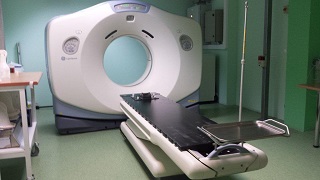A small-scale investment project aims to use new high-tech innovations in the cancer therapies in Greece through the supply of specific material for big impact. More than 400 medical students per year are given the opportunity to familiarise themselves with the new technology, and almost 3 000 cancer patients so far have been treated more efficiently.
- 22 May 2015
Without the simulator it would not be possible for the whole laboratory to operate. The importance is reflected by the fact that in order to issue a license for such laboratories, the Ministry of Health sets as key and strict requirement the purchase of this simulator.
The ERDF-funded project involves the supply and installation of a simulation system in the radiation laboratory of the Oncology department at the University Hospital of Thessaloniki (AHEPA). The simulator uses data obtained with the help of computed tomography (CT) technology and produces a treatment planning through simulations. The results are fed to the linear accelerator, which ultimately produces the actual radiation therapy.
According to the official records of the laboratory, 2 915 treatments have been given since 2009, when the project was launched, with remarkable results. About 30-40 % of the treatments were given for palliative reasons. These patients had tumours in advanced stages, there was no possibility of radical cure, and treatment aimed at reducing symptoms and improving quality of life. The remaining 60-70 % of treatments aimed at a radical cure in order to eradicate the tumour to achieve a full recovery.
An opportunity for future doctors
Apart from its clinical role, the simulator also contributes to the educational development of the university, as each year approximately 400 medical students become familiar with the operation of the laboratory through the field visits organised by the School of Medicine of the Aristotle University of Thessaloniki. Moreover, during the last four years only, five medical students have chosen to develop their postgraduate theses based on data and real-life cases of patients treated in this laboratory, enabling the impact of this project to be shared.
Professor Kyriaki Pistevou-Gobaki, director of the radiation laboratory which hosts the simulator, emphasises the vital importance of the simulation system as basis of the production of a treatment.
Total investment
Total investment for the project “Supply and installation of a simulation system in the radiation laboratory of the Oncology department at the University Hospital of Thessaloniki (AHEPA)” is EUR 999 600, with the EU’s European Regional Development Fund contributing EUR 849 660 from the operational programme “Central Macedonia – Western Macedonia – Eastern Macedonia & Thrace'” for the 2007 to 2013 programming period.

